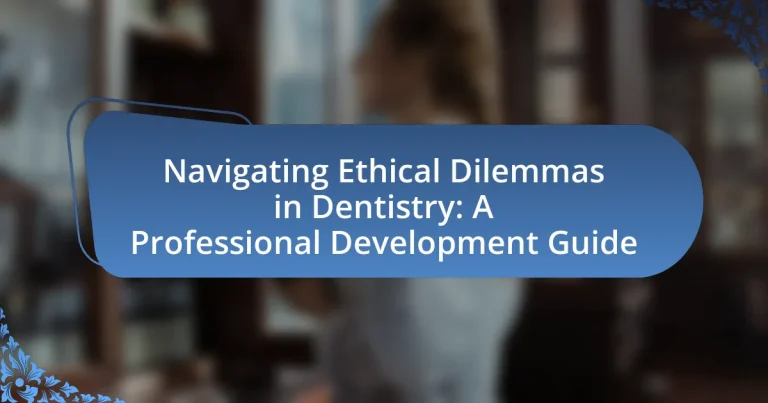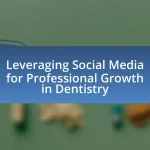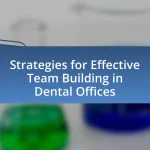The article “Navigating Ethical Dilemmas in Dentistry: A Professional Development Guide” focuses on the key ethical challenges faced by dental professionals, including patient autonomy, informed consent, and financial conflicts of interest. It examines how these dilemmas impact patient care and the dentist-patient relationship, highlighting the importance of ethical decision-making frameworks and continuous education. The article also discusses common scenarios that present ethical challenges, the role of professional organizations in providing guidance, and practical strategies for dentists to effectively navigate ethical dilemmas. By emphasizing the significance of ethical principles, the article aims to enhance the integrity and trust within dental practice.
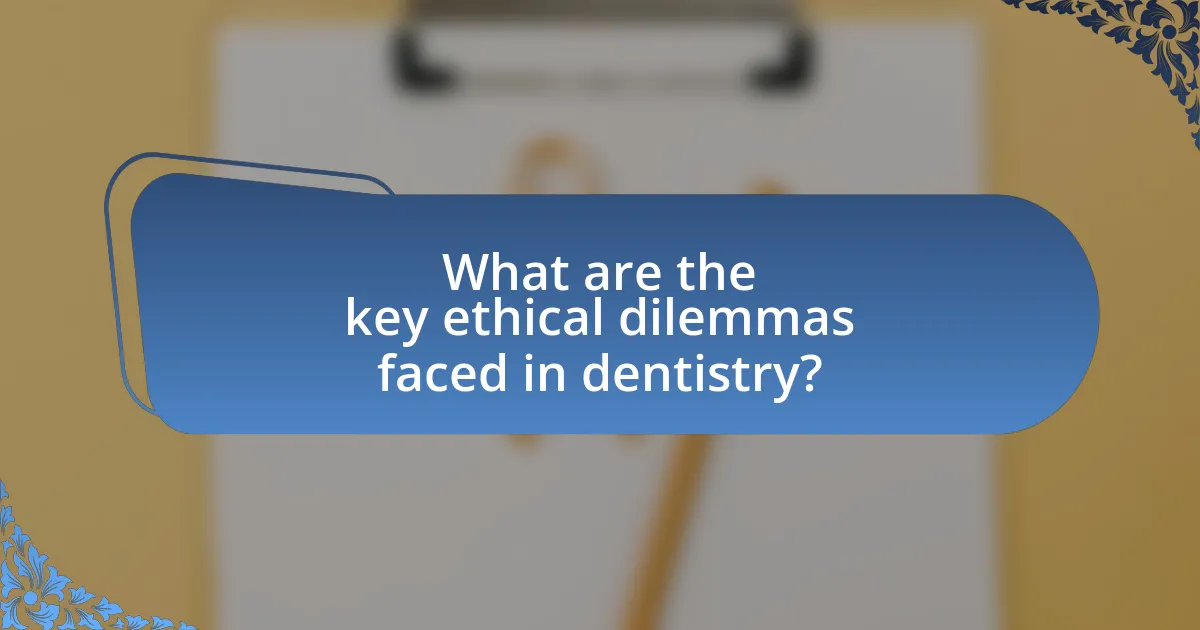
What are the key ethical dilemmas faced in dentistry?
Key ethical dilemmas faced in dentistry include issues related to patient autonomy, informed consent, and the balance between profit and patient care. Patient autonomy requires dentists to respect patients’ rights to make informed decisions about their treatment, which can sometimes conflict with the dentist’s professional judgment. Informed consent is critical, as dentists must ensure that patients fully understand the risks and benefits of procedures before agreeing to them. Additionally, the pressure to generate revenue can lead to conflicts of interest, where the financial incentives may overshadow the best interests of the patient. These dilemmas are supported by various studies highlighting the importance of ethical practices in maintaining trust and integrity in the dentist-patient relationship.
How do ethical dilemmas impact patient care in dentistry?
Ethical dilemmas significantly impact patient care in dentistry by influencing decision-making processes and potentially compromising patient outcomes. When dental professionals face conflicts between patient autonomy, beneficence, and non-maleficence, they may struggle to provide care that aligns with ethical standards. For instance, a study published in the Journal of Dental Research found that 30% of dentists reported experiencing ethical dilemmas that affected their treatment decisions, leading to variations in care quality. This inconsistency can result in patients receiving either unnecessary treatments or inadequate care, ultimately affecting their oral health and trust in dental providers.
What are common scenarios that present ethical challenges for dentists?
Common scenarios that present ethical challenges for dentists include issues related to informed consent, patient confidentiality, and the management of financial conflicts of interest. Informed consent challenges arise when patients do not fully understand the risks and benefits of proposed treatments, which can lead to ethical dilemmas regarding their autonomy and decision-making capacity. Patient confidentiality is often tested in situations where dentists must balance the need to share information with other healthcare providers against the obligation to protect patient privacy. Financial conflicts of interest can occur when dentists face pressure to recommend unnecessary treatments for financial gain, which raises questions about their professional integrity and commitment to patient welfare. These scenarios highlight the complex ethical landscape dentists navigate in their practice.
How do ethical dilemmas affect the dentist-patient relationship?
Ethical dilemmas significantly impact the dentist-patient relationship by creating trust issues and complicating communication. When dentists face ethical challenges, such as conflicts between patient autonomy and professional judgment, it can lead to misunderstandings or dissatisfaction from patients. Research indicates that a lack of transparency in addressing these dilemmas can diminish patient trust, as patients may feel their best interests are not being prioritized. For instance, a study published in the Journal of Dental Education found that ethical conflicts often result in patients questioning the integrity of their dental care provider, which can ultimately affect treatment adherence and patient loyalty.
Why is it important for dentists to navigate ethical dilemmas?
It is important for dentists to navigate ethical dilemmas because these situations directly impact patient care, trust, and professional integrity. Ethical decision-making ensures that dentists uphold the principles of beneficence, non-maleficence, autonomy, and justice, which are foundational to the practice of dentistry. For instance, a study published in the Journal of Dental Education highlights that ethical training improves decision-making skills and enhances patient outcomes, demonstrating the necessity for dentists to be equipped to handle complex moral issues effectively.
What are the potential consequences of unresolved ethical issues in dentistry?
Unresolved ethical issues in dentistry can lead to significant consequences, including harm to patient trust, legal repercussions, and damage to the professional reputation of dental practitioners. When ethical dilemmas are not addressed, patients may experience a decline in the quality of care, resulting in adverse health outcomes. For instance, a study published in the Journal of Dental Research highlighted that ethical breaches can lead to malpractice claims, which not only affect the dentist’s career but also increase healthcare costs for patients. Furthermore, unresolved ethical issues can foster a toxic work environment, leading to decreased job satisfaction among dental staff and higher turnover rates. These factors collectively undermine the integrity of the dental profession and can diminish public confidence in dental care.
How can ethical navigation enhance professional reputation?
Ethical navigation enhances professional reputation by fostering trust and credibility among peers and clients. When professionals consistently make ethical decisions, they demonstrate integrity, which is crucial in fields like dentistry where patient care is paramount. Research indicates that 85% of patients prefer to choose healthcare providers who exhibit ethical behavior, highlighting the direct correlation between ethical practices and patient loyalty. Furthermore, professionals known for their ethical standards are more likely to receive referrals and positive reviews, further solidifying their reputation in the industry.
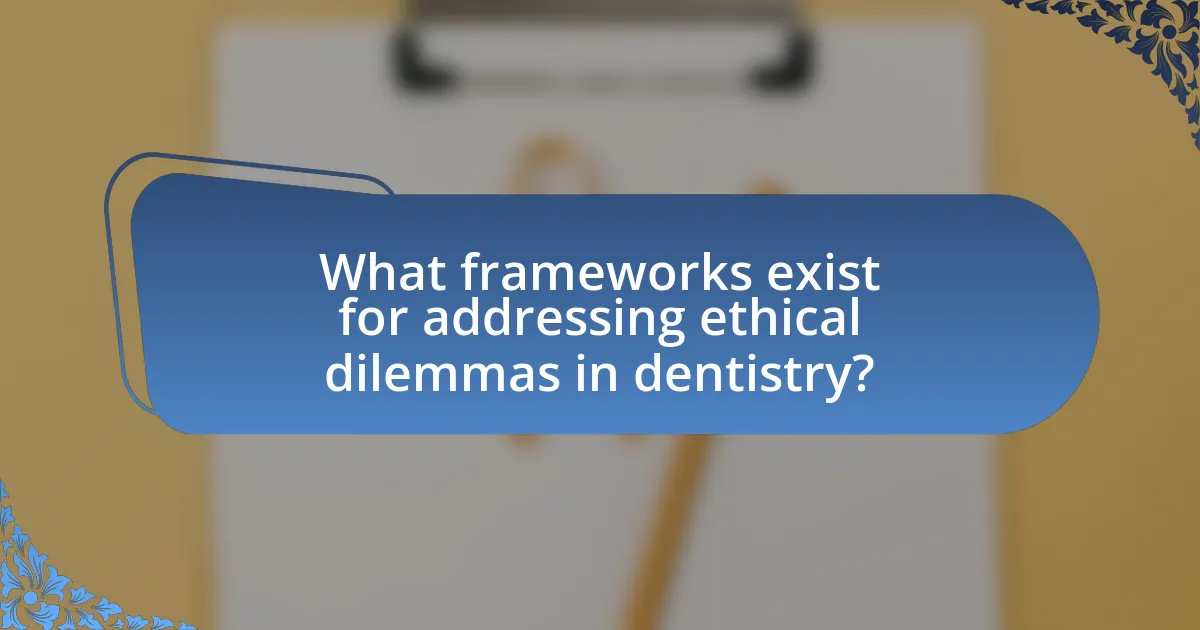
What frameworks exist for addressing ethical dilemmas in dentistry?
Several frameworks exist for addressing ethical dilemmas in dentistry, including the American Dental Association’s Principles of Ethics and Code of Professional Conduct, the Four Principles Approach, and the Ethical Decision-Making Model. The American Dental Association’s framework emphasizes patient autonomy, beneficence, non-maleficence, and justice, providing a structured approach for dental professionals to evaluate ethical issues. The Four Principles Approach, developed by Beauchamp and Childress, focuses on balancing respect for autonomy, promoting good, avoiding harm, and ensuring fairness in treatment decisions. The Ethical Decision-Making Model guides practitioners through a step-by-step process to identify ethical issues, consider relevant facts, evaluate options, and make informed decisions. These frameworks are validated by their widespread adoption in dental education and practice, ensuring that ethical considerations are integral to patient care.
How can ethical principles guide decision-making in dental practice?
Ethical principles guide decision-making in dental practice by providing a framework for evaluating the moral implications of clinical choices. These principles, including autonomy, beneficence, non-maleficence, and justice, help dental professionals navigate complex situations by prioritizing patient welfare, informed consent, and equitable treatment. For instance, the principle of autonomy emphasizes the importance of respecting a patient’s right to make informed decisions about their care, which is supported by the American Dental Association’s Code of Ethics. This code outlines the necessity for dentists to communicate effectively and ensure patients understand their treatment options, thereby fostering trust and transparency in the patient-provider relationship.
What are the core ethical principles relevant to dentistry?
The core ethical principles relevant to dentistry are autonomy, beneficence, non-maleficence, and justice. Autonomy emphasizes the patient’s right to make informed decisions about their own care. Beneficence requires dentists to act in the best interest of the patient, promoting their well-being. Non-maleficence obligates dental professionals to avoid causing harm to patients. Justice pertains to fairness in the distribution of dental resources and treatment. These principles are foundational in guiding ethical decision-making in dental practice, ensuring that patient care is both responsible and equitable.
How do these principles apply to real-world dental situations?
Ethical principles in dentistry, such as beneficence, non-maleficence, autonomy, and justice, directly influence real-world dental situations by guiding practitioners in decision-making processes. For instance, when a dentist encounters a patient who refuses a recommended treatment, the principle of autonomy requires the dentist to respect the patient’s decision while ensuring they are fully informed about the consequences. Additionally, the principle of beneficence compels the dentist to act in the best interest of the patient, which may involve providing alternative treatment options or additional information to help the patient reconsider their choice. Evidence from the American Dental Association emphasizes that adherence to these ethical principles not only enhances patient trust but also improves treatment outcomes, demonstrating their practical application in everyday dental practice.
What role do professional organizations play in ethical guidance?
Professional organizations play a crucial role in providing ethical guidance by establishing standards and codes of conduct for their members. These organizations, such as the American Dental Association, create frameworks that outline ethical practices, ensuring that dental professionals adhere to principles of integrity, patient care, and professional responsibility. By offering resources, training, and support, these organizations help practitioners navigate complex ethical dilemmas, thereby promoting accountability and trust within the profession.
Which organizations provide resources for ethical decision-making in dentistry?
The American Dental Association (ADA) provides resources for ethical decision-making in dentistry, including a comprehensive Code of Ethics and various educational materials. Additionally, the American College of Dentists (ACD) offers guidance on ethical practices and decision-making frameworks. The Academy of General Dentistry (AGD) also contributes by providing continuing education and resources focused on ethical considerations in dental practice. These organizations are recognized for their commitment to promoting ethical standards and supporting dental professionals in navigating ethical dilemmas.
How can dentists utilize these resources effectively?
Dentists can utilize resources effectively by integrating ethical guidelines and professional development tools into their practice. By accessing continuing education programs, dentists can stay updated on ethical standards and best practices, which enhances their decision-making in complex situations. Research indicates that ongoing training improves clinical outcomes and patient satisfaction, as seen in studies published in the Journal of Dental Education, which highlight the correlation between ethical training and improved patient trust. Additionally, utilizing peer support networks allows dentists to share experiences and strategies for navigating ethical dilemmas, fostering a collaborative approach to problem-solving.
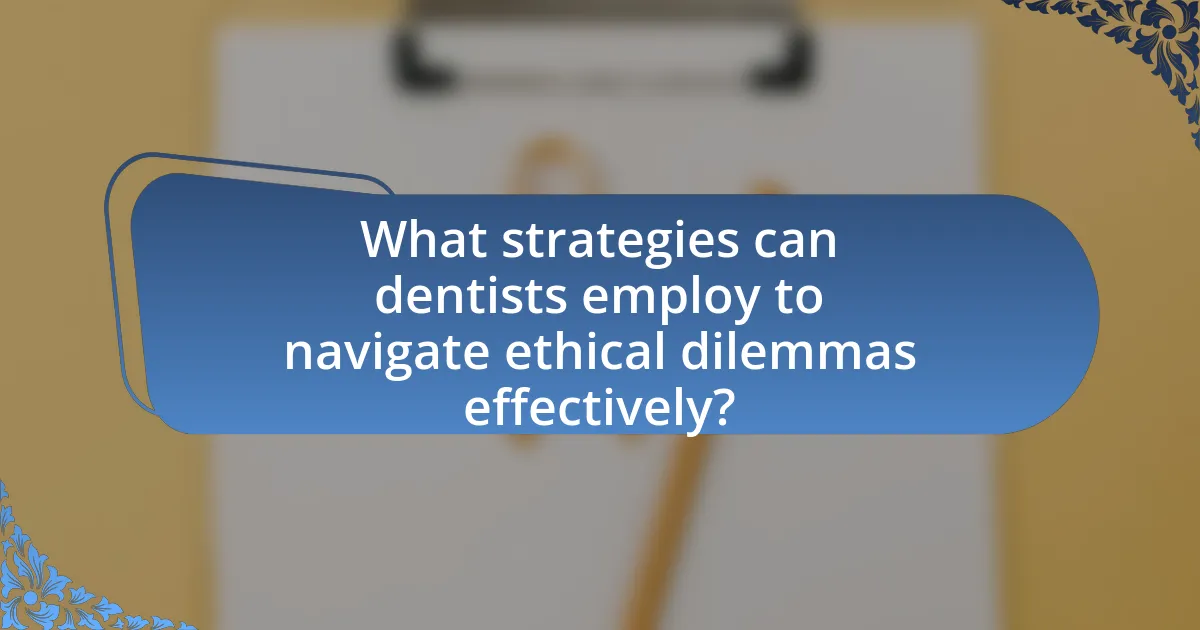
What strategies can dentists employ to navigate ethical dilemmas effectively?
Dentists can employ several strategies to navigate ethical dilemmas effectively, including adhering to established ethical guidelines, engaging in continuous education, and fostering open communication with patients. Adhering to established ethical guidelines, such as those provided by the American Dental Association, helps dentists make informed decisions that align with professional standards. Continuous education allows dentists to stay updated on ethical practices and emerging issues in the field, enhancing their ability to address dilemmas. Additionally, fostering open communication with patients encourages transparency and trust, enabling dentists to better understand patient concerns and make ethical decisions that prioritize patient welfare. These strategies collectively support dentists in managing ethical challenges in their practice.
How can continuing education enhance ethical decision-making skills?
Continuing education enhances ethical decision-making skills by providing dental professionals with updated knowledge on ethical standards and practices. This ongoing training equips practitioners with the tools to analyze complex ethical dilemmas, fostering critical thinking and informed decision-making. Research indicates that professionals who engage in continuous learning are better prepared to navigate ethical challenges, as they are exposed to diverse perspectives and case studies that illustrate real-world applications of ethical principles. For instance, a study published in the Journal of Dental Education found that continuing education significantly improved participants’ ability to identify and resolve ethical issues in clinical settings, demonstrating the direct impact of such programs on ethical competency.
What types of training programs are available for ethical dilemmas in dentistry?
Training programs for ethical dilemmas in dentistry include workshops, online courses, and continuing education seminars. These programs are designed to enhance practitioners’ understanding of ethical principles and decision-making processes in clinical practice. For instance, the American Dental Association offers continuing education courses that focus on ethical issues, while various dental schools provide workshops that simulate real-life ethical dilemmas. Additionally, online platforms like Coursera and edX offer courses on ethics in healthcare, which can be beneficial for dental professionals seeking to navigate complex ethical situations.
How can case studies improve understanding of ethical issues?
Case studies can improve understanding of ethical issues by providing real-world scenarios that illustrate complex moral dilemmas. These detailed accounts allow professionals to analyze the decision-making processes involved, highlighting the consequences of various actions. For instance, a case study in dentistry might explore a situation where patient confidentiality is at stake, prompting discussions on ethical obligations and legal requirements. Such analyses foster critical thinking and enhance ethical reasoning skills, as practitioners learn to navigate similar dilemmas in their own practice. Research indicates that experiential learning through case studies significantly enhances ethical awareness and decision-making capabilities among healthcare professionals.
What best practices should dentists follow when faced with ethical dilemmas?
Dentists should adhere to a structured approach when faced with ethical dilemmas, which includes identifying the ethical issue, consulting relevant guidelines, engaging in open communication, and considering the impact on all stakeholders. Identifying the ethical issue involves recognizing the conflict between professional obligations and patient needs. Consulting relevant guidelines, such as the American Dental Association’s Code of Ethics, provides a framework for decision-making. Engaging in open communication with patients and colleagues fosters transparency and trust, while considering the impact on stakeholders ensures that decisions are made with a holistic perspective. These practices are supported by ethical frameworks in healthcare that emphasize patient autonomy, beneficence, and justice, which guide practitioners in resolving dilemmas effectively.
How can open communication with patients mitigate ethical challenges?
Open communication with patients can mitigate ethical challenges by fostering trust and transparency in the patient-provider relationship. When healthcare professionals engage in open dialogue, they can better understand patients’ values, preferences, and concerns, which leads to more informed consent and shared decision-making. Research indicates that effective communication reduces misunderstandings and enhances patient satisfaction, ultimately minimizing the risk of ethical dilemmas related to autonomy and informed consent. For instance, a study published in the Journal of Dental Education found that clear communication significantly improved patient adherence to treatment plans, demonstrating that when patients feel heard and understood, they are more likely to comply with ethical standards in their care.
What role does self-reflection play in ethical decision-making?
Self-reflection is crucial in ethical decision-making as it enables individuals to critically assess their values, beliefs, and motivations. This introspection allows dental professionals to recognize biases and emotional responses that may influence their choices. Research indicates that self-reflection enhances moral reasoning, leading to more informed and responsible decisions. For instance, a study published in the Journal of Dental Education found that reflective practices improved students’ ability to navigate ethical dilemmas by fostering a deeper understanding of ethical principles and personal accountability. Thus, self-reflection serves as a foundational tool for ethical decision-making in dentistry.
What practical tips can help dentists navigate ethical dilemmas?
Dentists can navigate ethical dilemmas by adhering to a structured decision-making process that includes identifying the ethical issue, considering the relevant laws and regulations, consulting ethical guidelines from professional organizations, and seeking peer advice. This approach ensures that dentists make informed decisions that align with both legal standards and ethical principles. For instance, the American Dental Association provides a Code of Ethics that outlines fundamental ethical principles, which can serve as a valuable resource for dentists facing challenging situations. Additionally, engaging in continuous education and training on ethics can enhance a dentist’s ability to recognize and address ethical dilemmas effectively.
